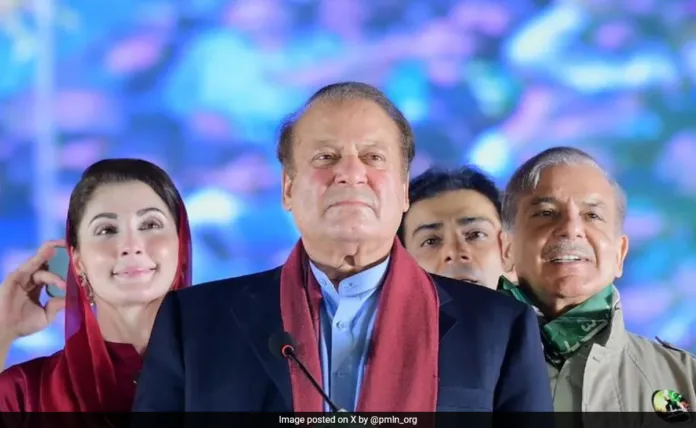Former Pakistani Prime Minister Nawaz Sharif declared victory in the national elections on Friday, stating his party had emerged as the largest and would engage in discussions with other groups to form a coalition government, as it had not achieved a clear majority independently.
Sharif made his announcement following the declaration of results from more than three-quarters of the 265 seats, over 24 hours after the polls closed on Thursday, an event overshadowed by the deaths of 28 individuals in militant attacks.
Analysts had forecasted a lack of a clear winner, further complicating the situation for a nation attempting to recuperate from an economic downturn whilst dealing with increased militant violence within a deeply divided political landscape.
The outcomes revealed independents, most endorsed by the imprisoned former Prime Minister Imran Khan, secured the highest number of seats – 92 out of the 225 tallied by 1600 GMT.
Sharif’s Pakistan Muslim League-Nawaz (PML-N) won 64 seats, while the Pakistan People’s Party of Bilawal Bhutto Zardari, son of the late premier Benazir Bhutto, secured 50. The remainder were claimed by smaller parties and other independents. “The Pakistan Muslim League is today the single-largest party in the country following the elections, and it is our responsibility to extricate this country from its current turmoil,” Sharif stated during a press conference in Lahore, the eastern city. “Regardless of whether they are independents or parties, we respect the mandate they have received,” he added. “We invite them to join us in aiding this beleaguered nation to stand once again.”
Sharif, 74, who has served as premier three times, returned from a self-imposed four-year exile in the United Kingdom late last year, having contested the previous election from a prison cell due to a corruption conviction. He was considered the frontrunner to lead the nation, having resolved a longstanding feud with the influential military. Sharif mentioned his party would have preferred an outright majority but, lacking this, would commence negotiations with others, including former President Asif Ali Zardari of the PPP, as early as Friday night.
In their initial response, a senior aide to Khan mentioned leaders of his Pakistan Tehreek-e-Insaf (PTI) party would convene on Saturday to deliberate on the outcomes and also meet with Khan in prison, as reported by Geo News. The delay in election results, attributed by the caretaker government to the suspension of mobile phone services for security measures before Thursday’s election, was unusual. Although independent members cannot independently form a government due to Pakistan’s complex electoral system, which also includes reserved seats to be allocated to parties based on their performance, they do have the option to affiliate with any party post-election. Khan’s party was disqualified from the election, leading his supporters to run as independents.
CHALLENGES FOR COALITION Moody’s Investors Service noted, “A prompt declaration of results leading to the smooth formation of a new government will diminish policy and political uncertainty.” This is vital for a country confronting severe macroeconomic challenges. The delay in announcing results was atypical for Pakistani elections. The uncertainty led to a downturn in Karachi’s stock index and Pakistan’s sovereign bonds.
An “internet issue” was cited as the cause of the delay by Zafar Iqbal, a special secretary at the election commission, without providing further details. The primary electoral contest was anticipated to be between candidates supported by Khan, whose PTI triumphed in the previous national election, and the PML-N. Khan contends that the military is orchestrating a campaign to eliminate his party, while analysts and adversaries believe Sharif is receiving military support.
Despite the military’s historical dominance in Pakistan, either directly or indirectly, since its independence 76 years ago from Britain, it has recently asserted its non-involvement in politics. Analysts suggest a coalition government would face difficulties in addressing numerous issues, most importantly securing a new bailout programme from the International Monetary Fund (IMF) following the expiry of the current agreement in three weeks.
The borders with Iran and Afghanistan were temporarily sealed as security measures were heightened. Despite these precautions, 28 people, including two children, lost their lives in 56 incidents, such as bomb and grenade explosions and shootings by militants, as reported by the Interior Ministry. Washington expressed its anticipation for “prompt, comprehensive election results” from Pakistan, reflecting the populace’s will.
Author : Atif Syed
